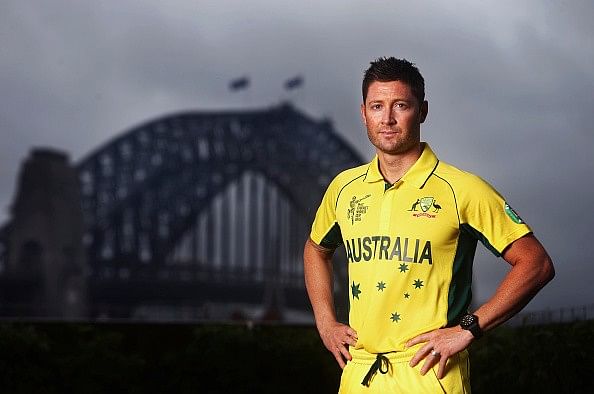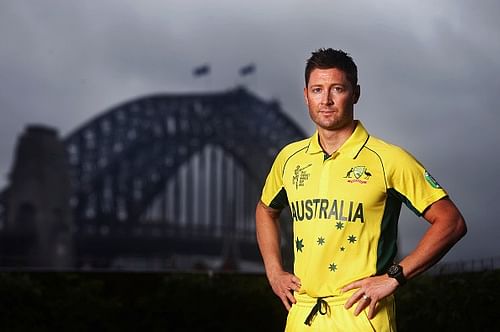
Michael Clarke - Last of the Australian Mughals

When a boyish Michael Clarke made his Test debut for Australia, in Bangalore in the winter of 2004, at least 7 players of the marauding Australian side of the last decade were still plying their trade. Glenn McGrath and Shane Warne were still a few years away from their respective retirements, Adam Gilchrist was leading the side in the interim absence of Ricky Ponting, and the opening slots were safely occupied by Matthew Hayden and Justin Langer.
It was in these extremely settled circumstances that Clarke made his debut. A debut that he would go on to remember. Not only did he stand his ground amidst legends, he actually went on to play the defining innings of the game, and was adjudged man of the match.
In the end, it turned out to be a momentous series for the touring Australians, giving them their first series win in India in 35 years. Clarke ended the series with rather bizarre bowling figures of 6 for 9 in a losing cause, on a spinning dustbowl at the Wankhede, setting him up for a whirlwind career which is all set to conclude 11 years on at The Oval.
Clarke’s place among great Australian captains
Going into his farewell game, Clarke has 8628 runs with 28 centuries and an average of a shade under 50, securing his place as one of the modern greats Test match cricket has witnessed. For a man who started his career in the golden era of Australian cricket though, it is sad to see Clarke depart with his team in such disarray.
While there have been significant crests during his time as a captain including a World Cup win and an Ashes whitewash at home; it is the depth of his troughs that paints a particularly sorry picture on an otherwise illustrious career.
Following on in the legacy of leaders such as Allan Border, Mark Taylor, Steve Waugh and Ricky Ponting, Clarke was always considered to be a comparatively soft commander. While his performances vindicated his position as skipper of the side, the comparative lack of steel meant his Australia gradually lost the mental edge they once had on their opponents.
Under Clarke, the Australians were more than once found without a plan in the heat of battle – most famously on the 2013 tour of India when the team management shockingly suspended four players for not having submitted a ‘homework’ assigned by coach Mickey Arthur. They were soundly beaten on that tour, losing all four Tests by heavy margins; leading to Arthur being replaced by Darren Lehmann soon after.
Clarke also oversaw two of Australia’s most embarrassing collapses, his sides shot out for 47 and 60, thanks to Vernon Philander’s 5-15 and Stuart Broad’s 8-23 respectively in Cape Town and Trent Bridge.
People who have grown up in the 90’s watching cricket would expect Australia to inflict such carnage on the opposition and hence it is no surprise that the Trent Bridge loss left Clarke without an Australian future. That defeat also took his tally of Ashes losses to 7, the highest amongst Australian skippers. It is another matter though, that there are 3 other captains to have overseen more Ashes defeats, all 3 of them English.
A charming smile and refreshing vulnerability
As a batsman though, Clarke was a sublime operator, who used his bat like a geometric tool to bisect the field and create gaps. Strong in all areas in front of the stumps, his batting made for delightful viewing when in full flow. Add to that a disarming smile and a cheeky grin and there is no doubt that Michael Clarke will be sorely missed on the international arena.
At a time when cricketers and administrators of the game take pride in a constructed, put on mask in their media interactions, Clarke showed a refreshing vulnerability at times. Speaking on the eve of Ponting’s retirement, the emotion of the moment seemed to consume him and it was a beautiful reminder of what teams play for, beyond the cold facts of victory and defeat.
The loss of his dear friend to a tragic on-field injury seemed to take a toll on Clarke, although he handled the situation with a lot of poise both on and off the field.
You could say Clarke was slightly unlucky in inheriting a kingdom already on its decline. It was Ponting without doubt who enjoyed the best part of a great team and who had the likes of McGrath and Warne to share a chunk of the 20 wickets needed to win a game. It is more than coincidental then, that Ponting remains the only cricketer in history to have 100 Test match victories against his name.
Comparing the Australian reign with the Mughal era in Indian history, one can probably say that Michael Clarke was the last great ruler of a dynasty nearing the end of its life cycle. Better times might yet return sooner than later in Australian cricket, however there is no doubting that change is on the cards.